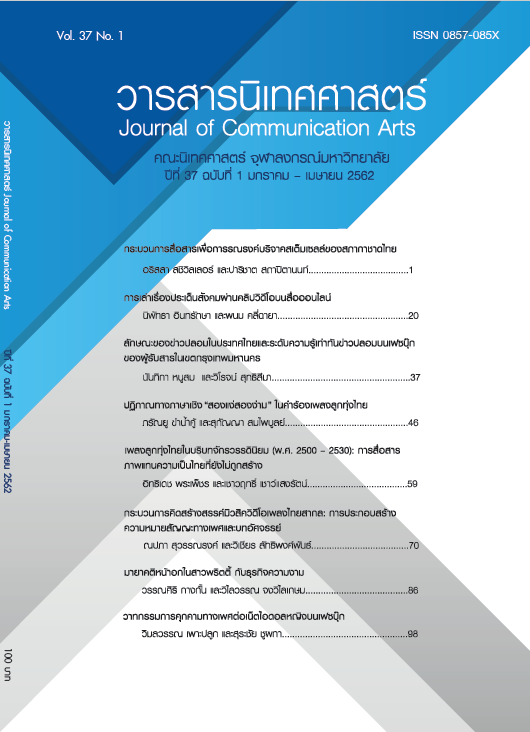The Discourse of Sexual Harassment to Female Internet Idol on Facebook
Main Article Content
Abstract
This article aims to study about the discourse of sexual harassment to female internet idol on facebook. Hence, the research objective is to study behavior, style and other environments of female internet idols as well as the Facebook followers. Furthermore, this study also examines the relationship between female internet idols and the followers. This research uses the qualitative research method and content analysis. The data is collected by observation and monitoring 6 female internet idols who has over 100,000 followers.
The finding of this research found that the female internet idols often present physical appearances from their private spaces to public sphere using on Facebook platform. Regarding the private space becomes the public sphere, the followers tend to cause the sexual harassment through staring then processing to the verbal to the female internet idols in the respect of threatening from sender to receiver. Therefore, the public sphere leads the female internet idols and their followers can disclose their freedom of expression which they unable to act in the real lives. Nonetheless, having an influence on each other might from the culture of social life in Thailand. Therefore, the society must provide and offer an opportunity for juveniles in term of acquiring the correct acknowledgment about sexology for preventing the power of sexual harassment in the future.
Keywords : Discourse, Sexual harassment , Female internet idol , Facebook
Article Details
References
กาญจนา แก้วเทพ. (2554). ผู้คนที่หลากหลายในการสื่อสาร : เด็ก สตรี และผู้สูงอายุ.กรุงเทพฯ: โครงการเมธีวิจัยอาวุโส.
ข่าวสดออนไลน์. (2559). สุดช็อก! เน็ตไอดอล-นักร้องสาวญี่ปุ่นโดนหนุ่มแฟนคลับคลั่ง จ้วงแทง 20 แผล-โคม่า. เข้าถึงเมื่อ 24 ธันวาคม 2559. จาก https://www.khaosod.co.th/view_newsonline.php?newsid=1463910679
ชนกพร พัวพัฒนกุล. (2556). ความสัมพันธ์ระหว่างภาษากับอุดมการณ์ในวาทกรรมการพยากรณ์ดวงชะตา: การวิเคราะห์ วาทกรรมเชิงวิพากษ์. วิทยานิพนธ์อักษรศาสตรดุษฎีบัณฑิต, จุฬาลงกรณ์มหาวิทยาลัย.
ไชยรัตน์ เจริญสินโอฬาร. (2554). แนะนำสกุลความคิดหลังโครงสร้างนิยม. กรุงเทพฯ: สมมติ. น.87-96.
ปาริฉัตร รัตนากาญจน์. (2551). การล่วงเกิน คุกคาม หรือก่อให้เกิดความเดือดร้อนรำคาญทางเพศต่อสตรีในที่ทำงาน: รูปแบบหนึ่งของการเลือกปฏิบัติด้วยเหตุทางเพศ. วิทยานิพนธ์นิติศาสตรมหาบัณฑิต,มหาวิทยาลัยธรรมศาสตร์.
ปุณยนุช ยอแสงรัตน์. (2553). การมีส่วนร่วมในพื้นที่สาธารณะของผู้หญิงโดยการส่งข้อความสั้นผ่านรายการเล่าข่าวทางโทรทัศน์. วารสารนิเทศศาสตร์, 28(1), น.65-76.
พิชาย รัตนดิลก ณ ภูเก็ต. (2558). คำหยาบ อารมณ์ เรือนร่าง และความเป็นมนุษย์. เข้าถึงเมื่อ 2 กันยายน 2559. จาก https://www.manager.co.th/AstvWeekend/ViewNews.aspx?NewsID=9580000035775
มาลี พฤกษ์พงศาวลี. (2540). แนวทางสู่ความเสมอภาคระหว่างหญิงชายในสหภาพแรงงาน และสถานที่ทำงาน. กรุงเทพฯ: อักษรเจริญทัศน์.
ทัศนีย์ ดำเกิงศักดิ์ และ พัชนี เชยจรรยา. (2554). การวิเคราะห์เนื้อหาเพศศึกษาและความพึงพอใจของผู้รับสารที่มีต่อคอลัมน์ “เสพสมบ่มิสม” และเว็บไซต์ meetdoctoro.com. วารสารนิเทศศาสตร์, 29(1), น.94-106.
รัชฏาภรณ์ ศรีรักษา. (2557). วาทกรรมการคุกคามทางเพศในชีวิตประจำวัน: การศึกษาวาทกรรมวิเคราะห์เชิงวิพากษ์. ปริญญาการศึกษามหาบัณฑิต, มหาวิทยาลัยศรีนครินทรวิโรฒ.
ระวิ แก้วสุกใส และชัยรัตน์ จุสาโล. (2556). เครือข่ายสังคมออนไลน์: กรณีเฟซบุ๊ก (Facebook) กับการพัฒนาผู้เรียน. Princess of Naradhiwas University Journal, 5(4), น.195-205.
วิโรจน์ สุทธิสีมา. (2557). การสื่อสารกับวาทกรรมการวิ่งในสังคมไทย. ปริญญานิเทศศาสตรดุษฎีบัณฑิต, จุฬาลงกรณ์มหาวิทยาลัย.
ศุภมาศ พะหุโล และ ภูริวัต บุญนัก. (2558). NET IDOL. เข้าถึงเมื่อ 15 ธันวาคม 2559. จาก https://www. tcdc.or.th/creativethailand/article/ClassicItem/22115
โสภา สถาพรชัยวัฒน์.(2550). วาทกรรมผู้หญิงเซ็กซี่ในนิตยสารมาร์สและอิมเมจ. วิทยานิพนธ์นิเทศศาสตรมหาบัณฑิต, จุฬาลงกรณ์มหาวิทยาลัย.
Azy Barak (2005). SEXUAL HARASSMENT ON THE INTERNET.12 Oct 2017. From https://www.unc.edu /courses/ 2010spring/law/357c/001/internetharassment/internet-harassment.html
BBC Thai. (2558). สัมภาษณ์พิเศษ: การคุกคามทางเพศออนไลน์. เข้าถึงเมื่อวันที่ 5 กันยายน 2559 จาก https://www.youtube.com/embed/Y2otYAnkAi4


